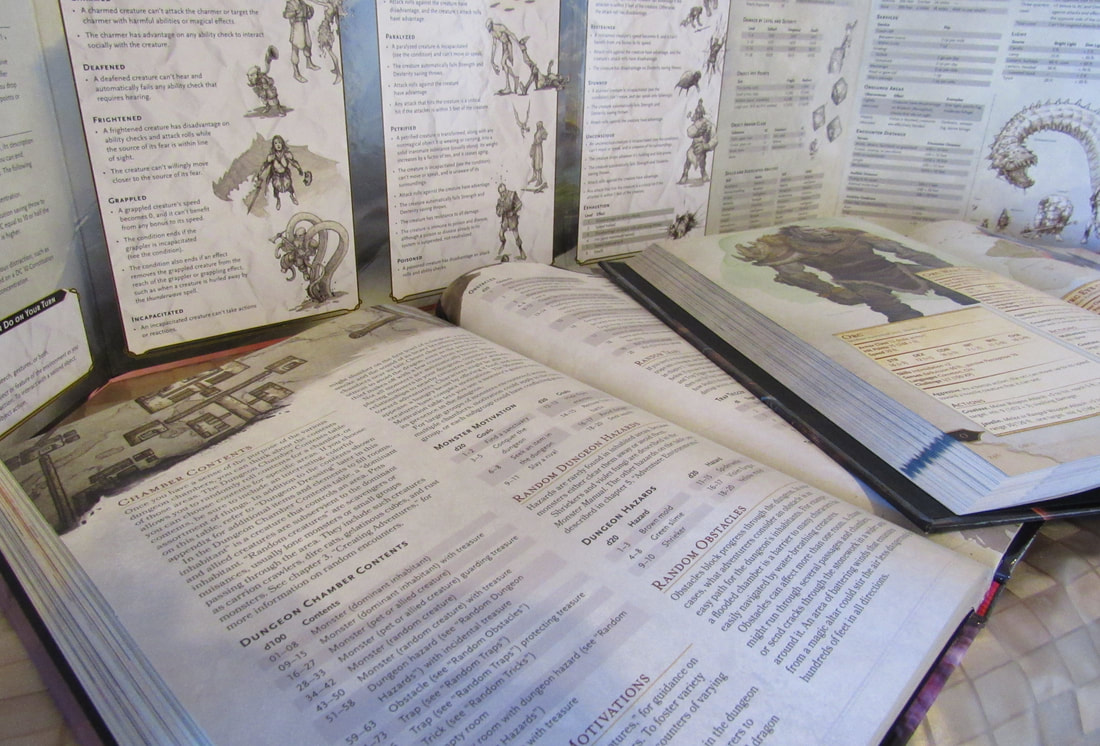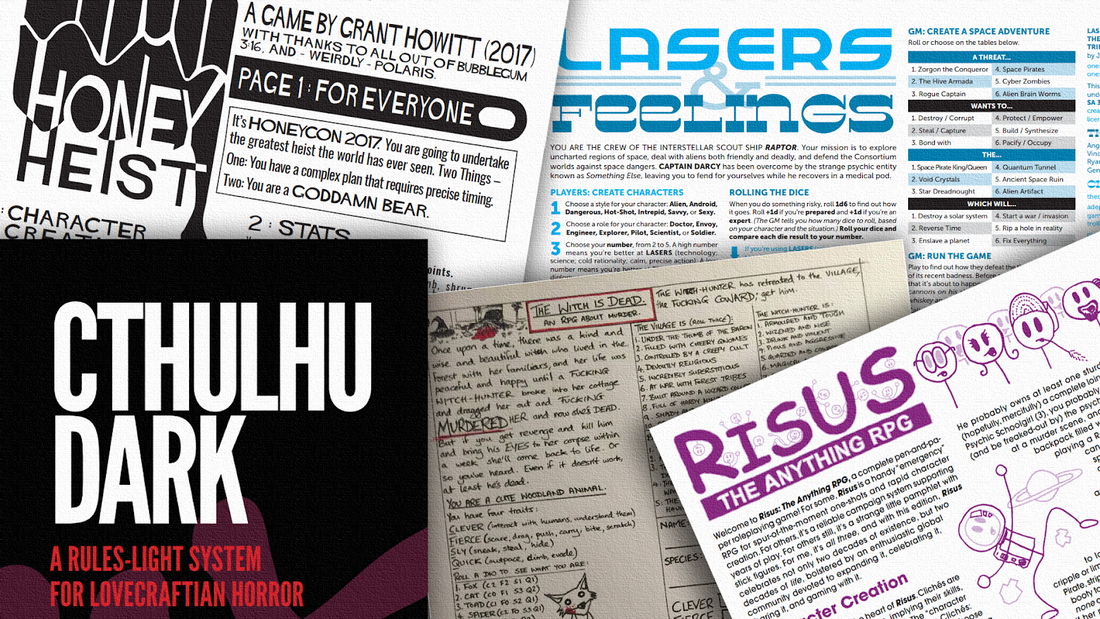|
The following scenes frequently pop up in most roleplaying games. Identifying them and knowing how best to use them will improve your game. This list does not intend to be exhaustive. Since each game comes with its own setting and rules, there are probably more types of scenes; however, these are the most common ones among all roleplaying games. 1) Combat Most roleplaying games involve combat and are usually designed around it. It is difficult to find a game that doesn’t have at least an entire chapter dedicated to it. It can involve many things: swords, guns, spaceships, magic, superpowers, etc. Sometimes all you need to do is throw a few monsters at the players and that’s good enough. But if you do that too much, combat can quickly become stale. A common way of improving it is by including monsters with unique abilities that the players haven’t encountered before. Another, is by making each monster in a group different. In a group of three goblins, perhaps one is an archer, another is a swordsman, and the last one, a sorcerer. Finally, using Aspects from the roleplaying game Fate is an easy way to make a location more interactive. You could have flimsy wooden columns holding the roof of the dungeon that the players might destroy to cause a collapse. Or a raging river that drags anyone that falls into it. Make each combat a dynamic engaging experience, and your players will thank you for it. 2) Investigation From social intrigue to searching the woods, clues are the key component in any investigation. Players gather up as many clues as they can and reach a conclusion based on them; with any luck, the right one. It is vital that clues are not locked behind specific dice rolls, as a failure may cause the story to reach an abrupt stop. Likewise, deciding when and where the clues are beforehand may result in players fumbling about in all the wrong places. It is best to leave clues open, so that players can discover them with their own creativity. If one player suggests an idea where a clue might be found, and it seems reasonable, go with it. For example, a player might use one of his specialized skills such as “Weapons Expert” to find out what kind of weapon was used to kill the victim. Your investigations will flow much more smoothly if you don’t set things in stone and are open to new ideas. 3) Social Conflict When an NPC has something that players want and is not immediately predisposed to handing it over, a social conflict ensues. One might be tempted to reduce social conflict to a single die roll, perhaps by persuasion or intimidation. But that turns NPCs into undecided characters that change their opinions because of a good die roll, and it quickly breaks immersion. Instead, make NPCs have motivations and roleplay accordingly. Be sure to make players aware of these motivations by hinting or outright saying them. As with clues, make sure to not lock things behind rolls. A greedy merchant might want to be paid to give information, with a die roll lowering or removing the price entirely. Meanwhile, a barkeep who only cares about the safety of their family might want some assurance that no harm will come to them. Following these tips, your NPCs will easily come to life and be more than just obstacles or quest givers. 4) Chase Whether you’re following an outlaw on horseback, driving down streets running from the law, or pursuing a rogue spaceship through an asteroid field, chases are always entertaining. A good chase has multiple obstacles, and just like before, it’s best to let the players overcome them with their own creativity. Defining which rolls the players have to make beforehand will result in players simply rolling dice without no choice at all, leaving it all to random chance. A chase need not even have two parties involved. For example, a party leaving a collapsing dungeon. Debris from the falling roof might be dodged, blocked with a shield, or destroyed with magic. For an improved player experience, avoid making chases a dull series of rolls and make it interactive instead, like any other scene would be. 5) Planning At some point, the players are going to stop and talk about what they are going to do next. They will discuss strategies and plans to overcome the obstacles to come. The best thing you can do here is listen. Players will often come up with original ideas you did not even fathom. It’s easy to say no and force them upon a predetermined path, but if they have good ideas, it’s best to adapt your plans to your players’ actions. If the players decide to use magic to fly up to the last floor of the antagonist’s tower, don’t make it have no windows or a “magic dampening field”; instead, turn it into a chase with the antagonist running through the different floors in the opposite order. Do give them some advantage for flying in though, perhaps a head start in the chase. Listening to your players is always important, and in planning scenes doubly so. Knowing what types of scenes there are will not only help you in using them well, but also improvising them and transitioning from one to another. A successful chase scene could lead up to a combat, whereas a failed one could end up in an investigation. Be sure to use plenty of different scenes to spice up your adventures, and as always, have fun! Rodrigo Peralta is a roleplayer and a DM that likes to playtest many different rpgs. He enjoys both highly detailed complex systems and barebone casual games. He participates in local roleplaying events as both DM and player. Picture provided by the writer A casual roleplaying game is one that has very few rules and mechanics. Most rulings are adjudicated on the fly, and for this reason they require a fair GM to run. The majority of roleplayers have a negative bias towards casual roleplaying games without having ever played any. Hopefully, with this article, I will be able to convince you to at least try them out! 1) Take A Break & Relax Sometimes you can get tired of a really long campaign or a certain theme or setting. Maybe you’ve had a difficult week, and all you want to do is blast aliens with a space cannon instead of solving the delicate intricacies of a complicated plot full of intrigue and mystery. But you also don’t want to spend hours creating new characters or learning an entire new system. Well in these cases, casual games are the way to go. They almost always have very short manuals, sometimes even being a single page long. They are also usually universal, meaning they have no setting or theme attached. Because of this, casual games are great for taking a short break. 2) Be Creative Again Most crunchy roleplaying games don’t allow complete freedom, as you are limited by the mechanics of the game in one way or another. Your character ideas have to fit the predefined rules of the game or otherwise it can end up being unbalanced or ‘broken’. Casual games use the same rules for everything. This means that a time-traveling samurai with cybernetic implants is just as powerful as a wild barbarian with a two handed axe. It may seem weird at first, but it allows you to be creative with your character designs. It doesn’t matter what your character is, because it's going to be as strong as everyone else. So what really matters is how your character does things. Because the rules are also light, it means you can attempt almost anything and the rules will cover those actions very easily. This allows players to be as creative as they want without thinking too much about rules, and without putting any strain whatsoever on the GM. 3) Involve New Players It’s also an ideal moment to invite new players to your table. Most detailed systems have very large manuals and a complicated rule set that must be learnt before a player can effectively join a game without slowing it down to a grind. Casual games usually take about 5 or 10 minutes to explain every single rule in the game. New players are also a great addition for casual games, because since they have never been bound by the rules of any system, they tend to be much more creative with their actions. After one or two sessions, these players might be willing to put a bit more effort and join your regular table. 4) Letting The GM Play Contrary to popular opinion, most GMs like being players. A casual game is an excellent opportunity to switch who is running the game and let your GM take a break. I can assure you they will be grateful. Some casual games also have mechanics for in-game GM rotation, where everyone takes a turn at running the game. Others can even be run without a GM. It is also a great learning opportunity. Running a game will teach you many things that you can use when you are a player again. It is also good to learn what it's like being the one behind the screen. 5) Practice Your Improvising Being a GM, one of the most difficult and useful abilities is improvisation. Without improvisation, every campaign you run will feel forced and players will lack any type of freedom. Most GMs don’t like improvising for fear it will ruin their campaign. Thats why, once again, casual games are a great time to train and hone those skills. If you’re feeling lucky, you could even improvise the entire oneshot, just following the players leads and seeing where that goes. I only recommend that as an exercise and not a style of running games. It can go either way, resulting in excellent stories or terribly dull ones. Some of the universal casual games I recommend are GURPS-Lite, Risus, Tango RPG, and Freeform Universal. If you want to play a short casual game that is tied to a specific setting you can try Lasers & Feelings, Honey Heist, The Witch is Dead, and Cthulhu Dark. There are many others out there, I hope you try some of them out! Rodrigo Peralta is a roleplayer and a DM that likes to playtest many different rpgs. He enjoys both highly detailed complex systems and barebone casual games. He participates in local roleplaying events as both DM and player. Picture provided by the writer |
All blog materials created and developed by the staff here at High Level Games Archives
April 2023
Categories
All
|
Proudly powered by Weebly



 RSS Feed
RSS Feed